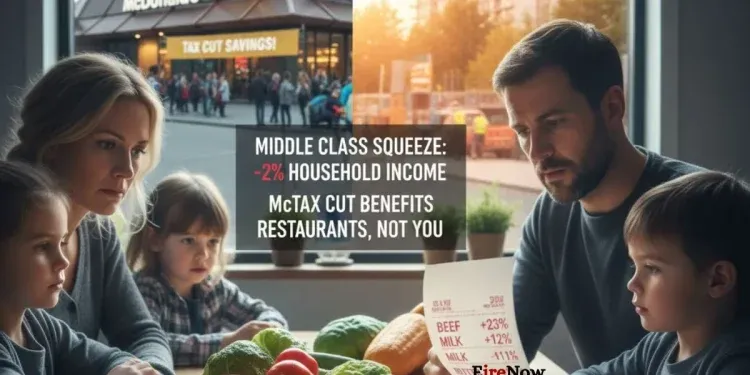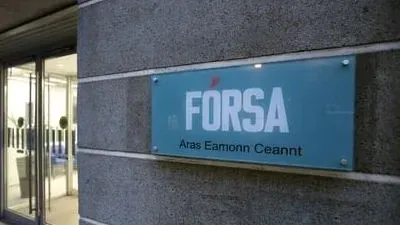DUBLIN- The full financial implications of the recent Budget have emerged, revealing that significant tax cuts allocated to the hospitality and apartment construction sectors have been implemented at the expense of Ireland’s middle-income earners, who now face reduced household income alongside soaring grocery costs.
An assessment by the Economic and Research Institute found the Budget is projected to result in a 2% reduction in overall household incomes, primarily affecting those in the middle-earning bracket. This comes as fresh inflation figures show food prices “galloping ahead” by nearly 5%, with staples like Beef up 23%, Milk up 12%, and Butter up 11%.
The core criticism centres on the government’s decision to grant an enormous tax relief to the hospitality sector—a move dubbed the ‘McTax cut’ by observers for its benefit to multinational fast-food chains like McDonald’s and Burger King—while failing to adjust income tax bands to alleviate the burden on workers.
Middle-Income Squeeze and Costly Relief
The failure to increase the threshold for the higher rate of tax means that wage increases—intended to combat the high cost of living (which rose 7.8% in 2022 and 6.3% in 2023)—are pushing workers into higher tax brackets, effectively negating their pay raises.
Annual financial impacts on middle-earning households include:
- Married couple (one PAYE earner, two children, €55,000 income): €49 worse off.
- Single PAYE worker (€75,000 income): €71 worse off.
- Single self-employed (€25,000 income): €28 worse off.
- Note: A couple on €35,000 with two children will be €1,846 better off due to the Working Family Payment.
The government’s priority was evident in the cost of the sectoral tax breaks. The VAT reduction for cafes and restaurants, an election promise by Fine Gael leader Simon Harris, is projected to cost €232 million next year and balloon to €690 million the following year. This high cost, alongside the €390 million spent on reducing VAT for new apartment sales by 2027, forced Minister for Finance Paschal Donohoe to bypass tax reductions for workers, which would have cost approximately €1.3 billion.
Hospitality: Needed Aid, Questionable Method
While the hospitality sector is undeniably struggling—with quarterly insolvency rates running at approximately 80 per 10,000 businesses compared to the national average of 30—the VAT cut is viewed as a misdirected intervention.
The Department of Finance had previously “slammed the idea of tax cuts for hospitality” in July last year, describing them as “unjustified” and constituting an “enormous fiscal transfer of taxpayers’ money.” Critics argue that by choosing this expensive, broad-based tax cut, the government simultaneously inflicted damage on the sector’s customer base by reducing their disposable income.
Housing Crisis Justification
The second major tax measure—the VAT reduction on the sale of new apartments—is considered more justifiable. Following a 24% collapse in apartment output last year, the Coalition felt compelled to use “every available lever” to address the severe housing crisis, spiraling rents, and homelessness. However, it remains to be seen whether this expensive tax break for developers will definitively result in the badly needed surge in housing supply.







